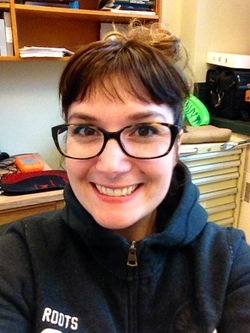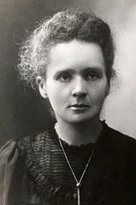 Hi folks! This month I'm in Vancouver at UBC with my Universitas 21 scholarship. I'm doing some tests of General Relativity with Prof. Ingrid Stairs (who is well known for being awesome in this field). I've got my own wee office in the Henngings building, 308B, which has unexpected additions such as a blow up palm tree (a frond can be seen in the background of this picture). Yesterday I gave a talk on my anisotropy work, which went well. The feedback was positive and I was treated to a nice dinner with plenty of leftovers for today :) I also had some interesting conversations with the CMB researchers who objected slightly to my rough estimate of the anisotropy level.. they would prefer more rigour, but wouldn't we all :) The weather has been, well, rainy. Today it hasn't rained yet, but I'm not holding my breath for any sun. I'll have to wait until I'm in Pasadena for that, which will be tomorrow night! My next talk is on Friday at Caltech.
2 Comments
 I spent most of this summer writing a massive Marie Curie International Outgoing Fellow proposal. I never thought I would actually win. In fact, it is only as of Friday that I stopped writing fellowship proposals and sending in lists of research interests/ CVs/ publications. Marie Curie is a personal hero of mine. When I was young, my parents would read to me about her from an old book which my father recently gifted me. Although the award has nothing to do with women in STEM per se, I am still proud to win an award which bares her name. The fellowship itself is funded by European Union (REA), and as such, has an outgoing and a return phase; 2yrs and 1 yr respectively. My project implements new and novel techniques to search for direct evidence of gravitational waves from supermassive black holes using Pulsar Timing Arrays by means of a new interdisciplinary collaboration in radio and infrared astronomy, data analysis and astrophysics. It will be hosted by two of the world’s best astronomical research institutes: The California Institute of Technology (Caltech) and the Jet Propulsion Laboratory (JPL) in the US, and the Max Planck Institute for Radio Astronomy (MPIfR) in Germany. It will be supervised by internationally renowned physicists Dr. Joseph Lazio and Prof. Dr. Michael Kramer. I hope to start June 1st! My stay in Ottawa started with a week of "Math Matters" at Carleton University, as per usual. This was a really special class. There were so many students who were right on the ball, and the students who struggled actively sought out extra help. My TAs were fantastic-- they were Johny Abboud and Maddi Green. I got a round of applause after my last lecture which just about brought a tear to my eye...
The following week, I gave a talk for a "special physics department colloquium". Peter Watson introduced me by reading the letter of reference he wrote me years ago. I then started my talk being quite emotional. The talk itself was "sold out"! The room was packed, there must've been about 50 people. Even the front row was packed! Frankly, I was expecting maybe 15 people to attend, and was really blown away by the attendance. I can't wait to come back and give another talk! Thanks everyone :D My new paper which appeared on the arXiv last week is about anisotropy in the stochastic gravitational wave background.
In a nutshell, when we look for gravitational waves in pulsar timing array data, we assume that the background we're looking for is isotropic, i.e. looks the same in all directions. In this paper, we relax this condition, and allow for anisotropy: that is to say, we don't assume that we're getting the same amount of GW power from every part of the sky. The neat thing is that we can recover the isotropic case as a special solution, but now we have a more general framework to do the data analysis in. I hope you all enjoy the paper!  A few weeks ago I was asked, for the first time ever, to referee an article for a journal called Classical and Quantum Gravity. For those of you outside the immediate realm of science and scientific research, being a referee means that you are given an article which was submitted to a journal and are asked to report back on its content: is it worth being published? how can it be made better? You become a guardian of science. Someone out there thinks you're good enough to know if this particular article is worth being published, and they respect your opinion (to a certain extent, obviously). You (and sometimes a second independent referee) become responsible for what scientific research is printed. That's a big responsibility. Being asked to play such a crucial role in the scientific process was incredibly emotional for me: I went from being incredulous (me? really??) to being very flattered (they must like something I did!) to being terrified (what if I screw it up??) to finally accepting that everyone must feel this way at first, so why not give it a go? After having written the report and having made my recommendations, I find that I've learned a lot. I felt that I was really capable of fulfilling this role and that I did in fact help to make an article a bit better. Does this mean that I'm a real scientist now? Who knows? Image: Heimdall, Guardian of the Rainbow Bridge to Asgard, http://en.wikipedia.org/wiki/Heimdall_(comics) What a busy month! One may have guessed by now that I apply for a lot of travel grants. This is a must right now in the UK, and if I'm not mistaken, a must in pretty much every research institute in the world at this particular moment in time. Travel is expensive, and getting funding from outside your group can be key to attending more conferences.
In this spirit, I applied for the Moreton Travel Award (this year one could apply for a maximum of £650) and was awarded £620 to attend the International Pulsar Timing Array Conference in Krabi, Thailand. This is awarded by the School of Physics and Astronomy at the University of Birmingham. Due to the vast expense of this particular conference (mostly just getting to Thailand is expensive, staying there is rather cheap!), I also applied to the Royal Astronomical Society's (RAS) Research and Grants fund to further offset the cost of this meeting to my group and was awarded £1000. So far, I have been successful in obtaining the following travel awards: the RAS's Research and Grants Fund, the Institute of Physics', IoP Research Student Conference Fund, the IoP's C. R. Barber Trust Award and Universitas 21 (check if your Uni is a member) and so could you! I strongly encourage physics graduate students in the UK to regularly apply for to these awards. Also, check your College / School / Department for funding to defray the costs of your travels. It looks good on your CV and your group will thank you! American grad students, you can apply for the APS Physics travel grant for $500! Next deadline is May 20th, so get your buts in gear. So far I've been able to wrangle £6,970 out of Birmingham's School of Physics and Astronomy (via the Moreton Award), the RAS and the IoP. If I can do it, so can you! In March, I put together an application to work with Prof. Ingrid Stairs at the University of British Columbia in Vancouver, Canada. We proposed to do further tests of General Relativity with either the double pulsar system or a pulsar-white dwarf system.
As I've just found out that my application was successful (hurrah!) I'll be going to UBC in January 2014 to carry out this research. If you're a researcher on the Canadian or American west coast, I may be able to pay you a visit/give a talk at your institute while I'm over. Let me know if you're interested! I plan on sh Great news! I've been asked to teach the engineering section of Math Matters again this fall. That means I'll be back in Ottawa in late August/early September to teach the course at Carleton University.
Further to the new teaching assignment, I've been asked to give a talk in the Physics Department at Carleton on my gravitational wave work. I'm really looking forward to giving a talk to my former professors on my research :D On Thursday the 25th of April 2013 technical companies, research- and educational institutes will opened their doors to young girls aged 10-15 years in order to awaken their interest in science and technology. During Girlsday, organized annually by VHTO, more than 8,000 girls discovered the world of science, technology and IT. On Thursday morning Princess Máxima officially launched Girlsday in the presence of the minister of Education at the independent research organisation TNO-the Hague.
I was invited to participate in Girls Day 2013, via Skype, at ASTRON (Netherlands Institute for Radio Astronomy) in the Netherlands. My role in this was to chat with 2 pairs of young ladies for an hour on Skype and to tell them about my work in astronomy. They were also encouraged to ask personal questions (not too personal! i.e. are you married, have kids, how old are you) so that the girls would see the astronomers as real people. I was very happy to answer their questions, and they indeed seemed to be very interested in my personal life over my career, but think this is normal for 13 year olds! It was a great opportunity to inspire a new generation of scientists and I hope the girls had as much fun as I did :) Yesterday, 20 March 2013, I went to London to participate in Voice of the Future 2013. It was an opportunity to meet with scientists from across the spectrum and discuss what really mattered to us. I just happened to sit next to Dr. Jo Parish, a lecturer in the School of Cancer Sciences at the University of Birmingham (of all places!), who was representing the Royal Society in Panels 3 and 4. There were also representatives from Science Grrl, a group which showcase the careers of real women scientists, in attendance much to the credit of the organisers. I was there to ask a question on behalf of the Royal Astronomical Society (RAS) and served on Panels 3 and 4 (although I only had 1 question).
My question asked Rt Hon David Willetts MP, Minister for Universities and Science and Prof. John Perkins, Chief Scientific Adviser to the Department of BIS about what they were doing to retain science PhDs who were dropping out of science after their studies. Although I cannot speak for the RAS about how they feel about the reply, it is safe to say that I was very dissatisfied with the response. David Willetts questioned the validity of this claim (and the research that had gone in to it) and then said that scientists who were not in Academia shouldn't be considered non-scientists. This obviously is not an answer to the RAS's question. I never mentioned Academia or scientists leaving it per se. At least David Willetts tried (somewhat half-heartedly in my opinion) to answer the question, Prof. Perkins did not. As Chief Scientific Advisor, I thought he would have had an opinion on the subject... I thought that the day was a good way to get scientists talking to Parliament, but it would have been more useful, in my opinion, if there were a dialogue. We could only ask our assigned question and wait for an answer; there was no opportunity for a rebuttal. If there had been, I would've clarified my question and made David Willetts answer my actual question. I'm not sure if all the MPs at Voice of the Future took this panel seriously. It seemed to me that they kept repeating the same answers to many different questions and didn't offer any new insights. The exception to this was Shabana Mahmood MP, Shadow Minister for Universities and Science. I found her answers to be sincere, thoughtful and meaningful. It's a shame she didn't participate in other Panels, I think she set the bar quite high. Perhaps the Biology Society would consider changing the format of VOF for 2014? I sincerely believe that even just 1 (optional) rebuttal from the person asking the question would greatly improve the quality of the answers and the overall impact of the VOF session. You can watch Voice of the Future 2013 here and decide for yourself! You may have to install Microsoft Silverlight to watch it ... grrrr... Follow Jo and her group on @HPVSupergroup and Science Grrl on http://www.sciencegrrl.co.uk/ and @Science_Grrl. |
AuthorChiara Mingarelli, science lover. Archives
January 2014
Categories |

 RSS Feed
RSS Feed
